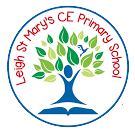Computing
Intent, Implementation and Impact
Computing Intent Statement
At Leigh St Mary’s, our intent for Computing education is to provide a curriculum that equips our pupils with the knowledge, skills, and understanding required to excel in the digital world, preparing them for future technological advancements. We aim to foster a love for Computing, inspire curiosity, and develop computational thinking that can be applied across various disciplines. We aim to instil an sense of enjoyment around using technology and to develop pupils’ appreciation of its capabilities and the opportunities technology offers to create, manage, organise and collaborate.
Through the use of the Kapow condensed scheme of work, we deliver a broad and balanced Computing curriculum that ensures pupils develop competence in coding for a variety of practical and inventive purposes, including the application of ideas in other subjects. Tinkering with software and programs forms a part of the ethos of the Kapow scheme of work. Through the delivery of this curriculum, we intend for pupils not only to be digitally competent and have a range of transferable skills at a suitable level for the future workplace, but also to be responsible online citizens. We aim for our pupils to have the ability to connect with others safely and respectfully online – understanding the need to act within the law; with moral and ethical integrity.
The intent of the Computing curriculum ensures the following:
- Pupil Outcomes
Pupils achieve exceptionally well in Computing, demonstrating a deep understanding of key concepts and their practical application. They make significant progress in acquiring computational thinking skills, problem-solving abilities, and digital literacy. Pupils develop confidence in using a range of software, programming languages, and digital tools. As a result, they are well-prepared for the next stage of their education and future employment opportunities.
- Engagement and Enthusiasm
Pupils demonstrate a high level of engagement and enthusiasm for Computing. They actively participate in lessons, showcasing their love for the subject. Pupils are motivated to explore new technologies, take ownership of their learning, and persevere when faced with challenges. The inclusive and supportive learning environment fosters a positive attitude towards Computing.
- Cross-Curricular Application
Computing is successfully integrated into other subjects, providing opportunities for pupils to apply their computational thinking skills across the curriculum. Pupils recognise the relevance of Computing in solving problems across various disciplines, enabling them to develop a deeper understanding of these subjects.
- Online Safety Awareness
Our pupils demonstrate a strong understanding of online safety and responsible digital citizenship. They are equipped with knowledge to stay safe online, identify risks, and make informed decisions. Pupils are confident in navigating the digital world, understanding the importance of privacy, consent, and respectful online communication.
Computing Curriculum Implementation
The National Curriculum purpose of study sates:
A high-quality computing education equips pupils to use computational thinking and creativity to understand and change the world. Computing has deep links with mathematics, science, and design and technology, and provides insights into both natural and artificial systems. The core of computing is computer science, in which pupils are taught the principles of information and computation, how digital systems work, and how to put this knowledge to use through programming. Building on this knowledge and understanding, pupils are equipped to use information technology to create programs, systems and a range of content. Computing also ensures that pupils become digitally literate – able to use, and express themselves and develop their ideas through, information and communication technology – at a level suitable for the future workplace and as active participants in a digital world.
At Leigh St Mary’s we have chosen Kapow as a basis for curriculum planning. The scheme of work is designed with three strands throughout;
- Computer Science
- Information Technology
- Digital Literacy
This high quality resources provides staff with the resources to ensure the successful implementation of our Computing curriculum. It is organised into five key areas, creating a cyclical route through which pupils can develop their computing knowledge and skills by revisiting and building on previous learning:
- Computer Systems and Networks
- Programming
- Creating Media
- Data Handling
- Online Safety
With Kapow as a basis for a high quality Computing curriculum, we also adhere to the following principles:
High-Quality Teaching and Learning
We employ highly skilled and knowledgeable Computing teachers who create a stimulating learning environment. Our teachers plan lessons that are well-structured, engaging, and tailored to meet the needs of all pupils, regardless of their background or ability. We place an emphasis on practical, hands-on experiences to enable pupils to apply their learning.
Broad and Balanced Curriculum
Our Computing curriculum offers a broad and balanced range of subjects that cover the three main components of Computing: computer science, information technology, and digital literacy. We strive to ensure that pupils have access to a wide range of experiences, including coding, programming, robotics, multimedia, and online safety. We also integrate Computing across other subjects to reinforce cross-curricular links.
Skills Development
We focus on developing pupils’ computational thinking skills, problem-solving abilities, logical reasoning, and creativity. Our curriculum is designed to progressively develop these skills from early years to upper key stage 2, enabling pupils to meet the challenges of an increasingly digital world. We provide opportunities for pupils to collaborate, communicate, and think critically, equipping them with transferable skills applicable in their future careers.
Continuous Professional Development (CPD)
All staff members receive regular CPD to enhance their subject knowledge and pedagogical skills in Computing education. This ensures that teachers are up to date with the latest technologies, trends, and teaching methodologies, enabling them to deliver outstanding Computing lessons.
Computing Curriculum Impact
The impact of the Computing curriculum, based upon Kapow’s scheme of work, can be constantly monitored through both formative and summative assessment opportunities. Pupils leave school equipped with a range of skills to enable them to succeed in their secondary education and be active participants in the ever-increasing digital world.
The impact is demonstrated in the following ways:
- Pupils are critical thinkers who are able to understand how to make informed and appropriate digital choices in the future.
- Pupils understand the importance Computing will have going forward in both their educational and working life and in their social and personal futures.
- Pupils understand how to balance time spent on technology and time spent away from it in a healthy and appropriate manner.
- Pupils understand that technology helps to showcase their ideas and creativity. They know that different types of software and hardware can help them achieve a broad variety of artistic and practical aims.
- Pupils can use technology individually and as part of a team.
- Pupils are aware of online safety issues and protocols and are able to deal with any problems in a responsible and appropriate manner.
- Pupils have an awareness of the developments in technology and have an idea of ow current technologies work and relate to one another.
- Pupils meet end of key stage expectations outlined in the National Curriculum for Computing.
- Pupils technical skills progress within all areas of the National Curriculum for Computing – computer science, information technology and digital literacy.
Computing Long Term Plan
Computing Progression Map

